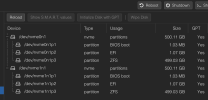Make sure you installed pfsense using UFS and and not as ZFS as ZFS got massive overhead and running ZFS on ZFS will exponentially increase the write amplification. There is also an option in the OPNsense webUI to store logs on a tmpfs, so logs will only be written to RAM and won't hit your disks. I would guess pfsense got a similar option.
FYI if you installed a VM with ZFS in-guest, you may not have to reinstall. As long as you're not running zfs boot/root and have an LVM-thin (or ext4 or XFS storage) with sufficient space, you can move the VM disk there and it won't be zfs-on-top-of-zfs anymore.


